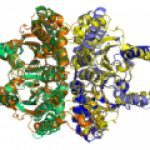Link to Pubmed [PMID] – 16790744
Infect. Immun. 2006 Jul;74(7):3715-26
Mycoplasma genitalium is associated with reproductive tract disease in women and may persist in the lower genital tract for months, potentially increasing the risk of upper tract infection and transmission to uninfected partners. Despite its exceptionally small genome (580 kb), approximately 4% is composed of repeated elements known as MgPar sequences (MgPa repeats) based on their homology to the mgpB gene that encodes the immunodominant MgPa adhesin protein. The presence of these MgPar sequences, as well as mgpB variability between M. genitalium strains, suggests that mgpB and MgPar sequences recombine to produce variant MgPa proteins. To examine the extent and generation of diversity within single strains of the organism, we examined mgpB variation within M. genitalium strain G-37 and observed sequence heterogeneity that could be explained by recombination between the mgpB expression site and putative donor MgPar sequences. Similarly, we analyzed mgpB sequences from cervical specimens from a persistently infected woman (21 months) and identified 17 different mgpB variants within a single infecting M. genitalium strain, confirming that mgpB heterogeneity occurs over the course of a natural infection. These observations support the hypothesis that recombination occurs between the mgpB gene and MgPar sequences and that the resulting antigenically distinct MgPa variants may contribute to immune evasion and persistence of infection.


